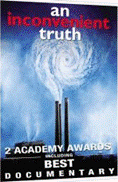| |
2006 December 10
Copyright © Brian Wright
An Inconvenient Truth 
(2006)__ 9/10
"Infinite Sink" no more
Directed by Davis Guggenheim
Written and Narrated by Al Gore
I must admit that respectfully listening to environmental analysis, or analysis of any sort, from a former United States senator of either mainstream party challenges my ability to keep an open mind.
But there is a time to recognize when one’s natural prejudgments descend into an ad hominem fallacy (ad hominem is essentially that the character of a man determines the validity of what he says). Instead, as Sgt. Joe Friday would say, we need “just the facts, Ma’am.”
And Mr. Gore has assembled quite a few facts in evidence of genuine, relatively near-term environmental threats to human civilization, if not survival. Further, Gore displays a remarkable intellectual courage and integrity in taking his message to audiences around the world.
I only have a couple of quibbles:
I’d prefer to have more quantitative data on his charts—he does include the data but not always. I’d also like to have had more suggestion of solutions. Finally, I can do without so many of his reminiscences of personal/political life. But on the level of genuine human concern, his personal touch is, well, touching.
###
An Inconvenient Truth begins with some beautiful space shots of the earth from Apollo and Galileo spacecraft, a rich multicolored oasis spinning in space. Our atmosphere is the most vulnerable part of our ecosystem because it is so thin: it is equivalent to the thickness of the veneer on a desktop globe.
In college Gore was a student of Dr. Roger Revelle, who in the mid 1950s with Charles David Keeling began to measure atmospheric carbon quantities. Carbon was ratcheting up yearly. As CO2 increases in the atmosphere, more radiation is retained, warming the earth. It ain’t voodoo science.
Now we’re seeing the effects, the 10 hottest years on record have occurred over the previous 16 years.
Glaciers are receding, Arctic ice is melting, Antarctic ice is melting, Greenland ice is melting, the latter two runoffs causing ocean levels to rise. Because of the increased temperatures of the water, hurricanes are much more intense, e.g. Katrina. Recent news stories warn ocean warming is disrupting the food chain.
I just read a story in the AP this a.m. (12/10/06) “Balmy temps, lack of snow may cancel out Europe’s winter.” This isn’t only bad news for ski operators: much of the water supply for Europe comes from runoff of mountain sources.
By the middle of the 21st century, unless something is done, the temperatures and carbon dioxide will be off the charts.
What can we do? Obviously, reduce carbon emissions from burning fossil fuels. Also find ways to scavenge carbon from the air—my personal recommendation is massive worldwide cultivation of hemp or other prolific vegetation with wide benefits. That’s just me.
Many other actions are available and we need to act, like, you know, now. Climate science is a complicated business, but virtually no scientist argues that the gross effects of higher anthropogenic CO2 and warmer global temperatures are not catastrophic.
As Gore says, “it’s a moral issue.” The moral is we need to apply reason to preclude these demonstrable environmental calamities. The days of infinite sink—that we can pollute because the earth is so large—are over, and we’re clearly in the era of Spaceship Earth.
For liberty-minded people, accepting that fact can present a challenge to a “wide-open-spaces” worldview. That’s why we need reason and dialog to make freedom work in closer quarters.
|



|




